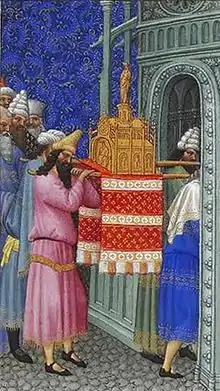Psalm 24
Psalm 24 is the 24th psalm of the Book of Psalms, generally known in English by its first verse, in the King James Version, "The earth is the LORD's, and the fulness thereof". In the Greek Septuagint version of the Bible and the Latin Vulgate, this psalm is Psalm 23 in a slightly different numbering system. In Latin, it is known as "Domini est terra et plenitudo eius orbis terrarum".[1] The psalm is marked as a Psalm of David.
| Psalm 24 | |
|---|---|
| "The earth is the LORD's, and the fulness thereof" | |
 Psalm 24 in a King James Bible | |
| Other name |
|
| Text | by David |
| Language | Hebrew (original) |
The psalm is a regular part of Jewish, Catholic, Anglican and Protestant liturgies. It has been set to music often, notably by Heinrich Schütz and Lili Boulanger. The section "Lift up your heads, O ye gates" has been associated with Advent, and paraphrased in hymns. George Frideric Handel set it in Part II of his Messiah, in a scene called "Ascension".
Background

David may have composed this psalm after buying the Temple Mount, intending for it to be sung at the dedication of the Temple by his son, Solomon. In verses 7 and 9, he instructs the gates of the Temple to open to receive God's glory at that time. The Talmud notes that when Solomon came to dedicate the Temple and bring in the Ark of the Covenant, the gates refused to open. They acceded only after Solomon prayed for them to open in the merit of his father, David.[2][3] Another possible Sitz im Leben of Psalm 24 is the situation described in 1 Chronicles 15 and 2 Samuel 6 where David brings the Ark of the Covenant from Obed-Edom's house up to the Tabernacle in Jerusalem.[4]
In the Temple service, Psalm 24 was designated as the Psalm of the Day for the first day of the week (Sunday), and was sung by the Levites after the offering of the regular daily sacrifice (tamid).[5] This tradition continued into the diaspora, as the psalm is sung on Sundays in synagogues around the world.[6]
In Christian thought, this psalm refers to the kingdom of Christ, and verses 7-10 depict the ascension to heaven. Spurgeon writes, "He who, fresh from the cross and the tomb, now rides through the gates of the New Jerusalem is higher than the heavens; great and everlasting as they are, those gates of pearl are all unworthy of him before whom the heavens are not pure, and who chargeth his angels with folly. Lift up your heads, O ye gates".[7] Henry concurs, adding that the Ark being brought up to Jerusalem symbolizes Christ entering into heaven, "and the welcome given to him there".[8]
Themes
The Midrash Tehillim notes the inversion of the first two words of this psalm compared to the preceding one, Psalm 23. Psalm 23 begins, "Mizmor LeDavid, a song of David", while this psalm begins, "LeDavid Mizmor, of David, a song". The Midrash explains that Mizmor LeDavid indicates that first David played on his harp, and then God's spirit rested upon him. LeDavid Mizmor indicates that first he was imbued with the holy spirit, and then he played.[9]
The Talmud in Berakhot 35 a-b remarks on the discrepancy between verse 1, "The world and its contents belong to God", and Psalm 115:16, "The heavens are God's, but the earth He has given to humans". It concludes that these verses express the importance of saying a blessing over food. Before one says a blessing, the food belongs to God and to consume it would be akin to stealing, but after saying the blessing, one has permission to eat it.[3]
Text
Hebrew Bible version
Following is the Hebrew text of Psalm 24:
| Verse | Hebrew |
|---|---|
| 1 | לְדָוִ֗ד מִ֫זְמ֥וֹר לַֽ֖יהֹוָה הָאָ֣רֶץ וּמְלוֹאָ֑הּ תֵּ֜בֵ֗ל וְיֹ֣שְׁבֵי בָֽהּ |
| 2 | כִּי ה֖וּא עַל־יַמִּ֣ים יְסָדָ֑הּ וְעַל־נְ֜הָר֗וֹת יְכֽוֹנְנֶֽהָ |
| 3 | מִי־יַֽ֖עֲלֶה בְּהַ֣ר יְהֹוָ֑ה וּמִי־יָ֜ק֗וּם בִּמְק֥וֹם קָדְשֽׁוֹ |
| 4 | נְקִ֥י כַפַּ֗יִם וּבַ֪ר לֵ֫בָ֥ב אֲשֶׁ֚ר לֹֽא־נָשָׂ֣א לַשָּׁ֣וְא נַפְשִׁ֑י (כתיב נַפְשִׁו) וְלֹ֖א נִשְׁבַּ֣ע לְמִרְמָֽה |
| 5 | יִשָּׂ֣א בְ֖רָכָה מֵאֵ֣ת יְהֹוָ֑ה וּ֜צְדָקָ֗ה מֵֽאֱלֹהֵ֥י יִשְׁעֽוֹ |
| 6 | זֶה דּ֣וֹר דֹּֽרְשָׁ֑יו (כתיב דֹּֽרְשָׁ֑ו) מְבַקְשֵׁ֥י פָ֜נֶ֗יךָ יַֽעֲקֹ֣ב סֶֽלָה |
| 7 | שְׂא֚וּ שְׁעָרִ֨ים | רָֽאשֵׁיכֶ֗ם וְ֖הִנָּֽשְׂאוּ פִּתְחֵ֣י עוֹלָ֑ם וְ֜יָב֗וֹא מֶ֣לֶךְ הַכָּבֽוֹד |
| 8 | מִ֥י זֶה֘ מֶ֚לֶךְ הַכָּ֫ב֥וֹד יְֽ֖הֹוָה עִזּ֣וּז וְגִבּ֑וֹר יְ֜הֹוָ֗ה גִּבּ֥וֹר מִלְחָמָֽה |
| 9 | שְׂא֚וּ שְׁעָרִ֨ים | רָֽאשֵׁיכֶ֗ם וּ֖שְׂאוּ פִּתְחֵ֣י עוֹלָ֑ם וְ֜יָבֹא מֶ֣לֶךְ הַכָּבֽוֹד |
| 10 | מִ֚י ה֣וּא זֶה֘ מֶ֪לֶךְ הַכָּ֫ב֥וֹד יְהֹוָ֥ה צְבָא֑וֹת ה֚וּא מֶ֖לֶךְ הַכָּב֣וֹד סֶֽלָה |
King James Version
- The earth is the LORD's, and the fulness thereof; the world, and they that dwell therein.
- For he hath founded it upon the seas, and established it upon the floods.
- Who shall ascend into the hill of the LORD? or who shall stand in his holy place?
- He that hath clean hands, and a pure heart; who hath not lifted up his soul unto vanity, nor sworn deceitfully.
- He shall receive the blessing from the LORD, and righteousness from the God of his salvation.
- This is the generation of them that seek him, that seek thy face, O Jacob. Selah.
- Lift up your heads, O ye gates; and be ye lift up, ye everlasting doors; and the King of glory shall come in.
- Who is this King of glory? The LORD strong and mighty, the LORD mighty in battle.
- Lift up your heads, O ye gates; even lift them up, ye everlasting doors; and the King of glory shall come in.
- Who is this King of glory? The LORD of hosts, he is the King of glory. Selah.
Uses
Judaism

Psalm 24 is designated as the Psalm of the Day for the first day of the week (Sunday) in both the Ashkenazi and Sephardi liturgies. Ashkenazi Jews also recite the psalm while the Torah scroll is carried back to the ark on weekdays, Rosh Chodesh, festivals, and during the Shabbat afternoon prayer. Both Ashkenazi and Sephardi Jews recite it on Rosh Hashanah and Yom Kippur after the evening prayer.[6] In the Siddur Avodas Yisroel, the psalm is also said after Aleinu during the evening prayer on weeknights.[10] Some congregations recite this psalm during the hakafot on Simchat Torah.[11]
Verse 1 is said by the earth in Perek Shirah. Additionally, verses 7-8 are the first call of the rooster, and verses 9-10 are the second call of the rooster, in that ancient text.[10][12]
Verse 5 is a "companion verse" for the word yissa (Hebrew: יִשָּׂא, may He turn) in the Priestly Blessing (Numbers 6:26).[10][13]
Verses 7-10 are included in the ten verses recited during the section of Malchuyot in the Mussaf Amidah on Rosh Hashanah.[14]
Psalm 24 is also recited as a prayer for financial success and to protect from a flood.[15]
New Testament
- Verse 1 is quoted in 1 Corinthians 10:26[16]
Protestantism
The Protestant minister Georg Weissel paraphrased the last section of Psalm 24 as an Advent hymn, "Macht hoch die Tür" (Make the door high) in 1623.[17] It became Number 1 in the current Protestant hymnal Evangelisches Gesangbuch (EG),[17] and appears in most German hymnals including the Catholic Gotteslob (GL 218). Catherine Winkworth translated it as "Lift up your heads, ye mighty gates" in 1853.[18]
The title of the hymn "Come Thou Almighty King", first published in 1757,[19] is based on verse 10 of this psalm.[20]
In the Free Church of Scotland's 2003 Psalter, Sing Psalms, the metrical version of Psalm 24 commences "The world and all in it are God’s, all peoples of the earth" and is set in the common metre. The recommended tunes are Nativity, Praetorius, Winchester and St. George's, Edinburgh.[21]
Musical settings
Heinrich Schütz set the psalm in German for choir as part of his setting of the Becker Psalter as SWV 121, "Die Erd und was sich auf ihr regt" (The Earth and what moves on it).[22] Andreas Hammerschmidt composed a six-part motet, "Machet die Tore weit" (Make the gates wide), setting verses 7–9.[23] Verses 7-10 are set in Handel's Messiah Part II (Chorus Lift up your heads) in 1742, in a scene called "Ascension".[24]
Henry Desmarest compoes one grand motet "Domini est terra" (unknown date)
Georg Friedrich Haendel (1685 - † 1759) : oratorio le Messie (HWV56, 1741), n° 33 « Lift up your heads, O ye gates. » dans lequel les versets 7 - 10 are sung by the chorus. booklet of Charles Jennens († 1773).
Lili Boulanger set the entire psalm in French, La terre appartient à l’Eternel in 1916 for mixed choir, organ, brass ensemble, timpani and 2 harps.[25]
References
- "Parallel Latin/English Psalter / Psalmus 23 (24)". Archived from the original on 2017-09-30. Retrieved 2018-12-07.
- Shabbat 30a.
- Abramowitz, Rabbi Jack (2018). "Sunday". Orthodox Union. Retrieved December 10, 2018.
- "Psalm 24 Commentary". ExplainingTheBook.com. 2017. Retrieved April 15, 2020.
- Rosh Hashanah 31a; Mishnah Tamid 7:4.
- Nulman 1996, p. 215.
- Spurgeon, Charles (2018). "Psalm 24 Bible Commentary". Christianity.com. Retrieved December 11, 2018.
- Henry, Matthew (2018). "Psalms 24". Bible Study Tools. Retrieved December 10, 2018.
- "Midrash Tehillim / Psalms 24" (PDF). matsati.com. October 2012. Retrieved December 10, 2018.
- Brauner 2013, p. 34.
- Nulman 1996, pp. 214-215.
- Slifkin 2002, pp. 3, 7.
- Scherman 2003, p. 698.
- Scherman 1985, p. 456.
- "Protection". Daily Tehillim. Retrieved December 10, 2018.
- Kirkpatrick, A. F. (1901). The Book of Psalms: with Introduction and Notes. The Cambridge Bible for Schools and Colleges. Book IV and V: Psalms XC-CL. Cambridge: At the University Press. p. 838. Retrieved February 28, 2019.
- Hahn, Gerhard, ed. (2000). "1 Macht hoch die Tür". Liederkunde zum Evangelischen Gesangbuch. Vandenhoeck & Ruprecht. pp. 52–57. ISBN 978-3-525-50319-5.
- Lift Up Your Heads, Ye Mighty Gates. The Harvard University Hymn Book. Harvard University Press. 2007. p. 101. ISBN 978-0-674-02696-4.
- "Come, Thou Almighty King". hymnary.org. Retrieved December 11, 2018.
- "Baptist Hymnal 1991 #247". hymnary.org. Retrieved December 11, 2018.
- https://freechurch.org/assets/documents/2017/Psalmody/Sing%20Psalms%20Combined%20Words%20Edition%20(incl.%20Scottish%20Psalter)%20-%20with%20bookmarks%20+Tune%20Reccomendations.pdf
- Schütz, Heinrich / Der Beckersche Psalter SWV 97a-256a Bärenreiter
- Psalm 24: Free scores at the Choral Public Domain Library (ChoralWiki)
- Stapert, Calvin (2010). Handel's Messiah: Comfort for God's People. Wm. B. Eerdmans Publishing. p. 120. ISBN 978-0-8028-6587-8.
- "Lili Boulanger, Psalm 24". repertoire-explorer.musikmph.de. Retrieved 12 March 2016.
Sources
- Brauner, Reuven (2013). "Shimush Pesukim: Comprehensive Index to Liturgical and Ceremonial Uses of Biblical Verses and Passages" (PDF) (2nd ed.).
- Nulman, Macy (1996). The Encyclopedia of Jewish Prayer: The Ashkenazic and Sephardic Rites. Jason Aronson. ISBN 978-1-4616-3124-8.
- Scherman, Rabbi Nosson (2003). The Complete Artscroll Siddur (3rd ed.). Mesorah Publications, Ltd. ISBN 978-0-89906-650-9.
- Scherman, Rabbi Nosson (1985). The Complete Artscroll Machzor – Rosh Hashanah (1st ed.). Mesorah Publications Ltd. ISBN 978-0-89906-676-9.
- Slifkin, Nosson (2002). "Perek Shirah" (PDF). Zoo Torah.
External links
| Wikisource has original text related to this article: |
| Wikimedia Commons has media related to Psalm 24. |
- Pieces with text from Psalm 24: Scores at the International Music Score Library Project
- Psalm 24: Free scores at the Choral Public Domain Library (ChoralWiki)
- Text of Psalm 24 according to the 1928 Psalter
- Psalms Chapter 24 text in Hebrew and English, mechon-mamre.org
- A psalm of David. / The earth is the LORD’s and all it holds, the world and those who dwell in it. text and footnotes, usccb.org United States Conference of Catholic Bishops
- Psalm 24:1 introduction and text, biblestudytools.com
- Psalm 24 – The Great and Sovereign God enduringword.com
- Psalm 24 / Refrain: The Lord of hosts: he is the King of glory. Church of England
- Psalm 24 at biblegateway.com
- Hymns for Psalm 24 hymnary.org